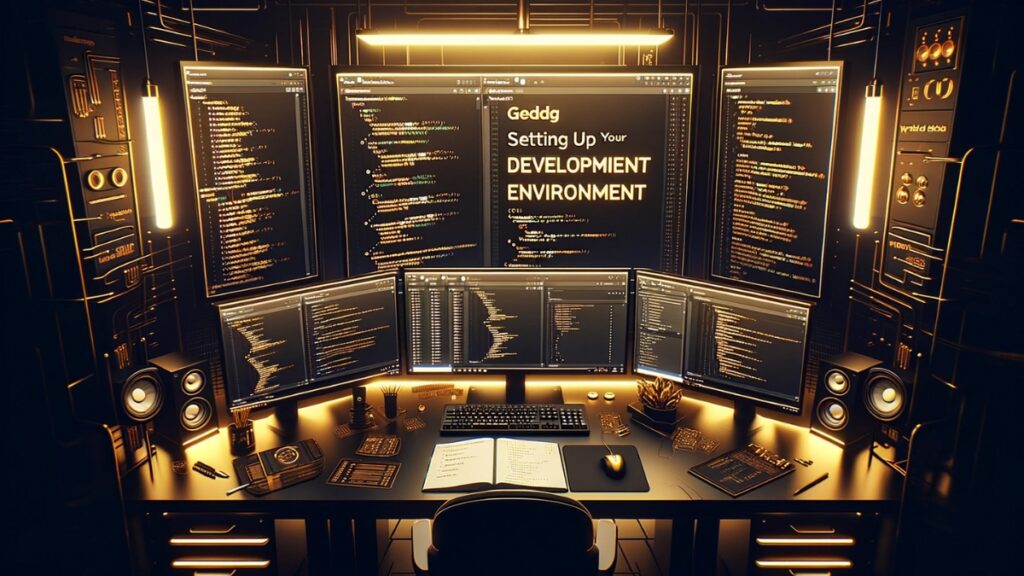The realm of game development has long been dominated by languages like C++ and Java, but there’s a silent yet potent player that deserves attention: Visual Basic (VB). While it might not be the first choice for hardcore game developers, Visual Basic, with its simplicity and powerful features, offers a unique and accessible entry point into the world of game creation. This section delves into the role and capabilities of Visual Basic in the gaming industry, shedding light on how this often-overlooked language can be a valuable tool for developers.
The Landscape of Game Development with Visual Basic
Visual Basic, a high-level programming language developed by Microsoft, is known for its simplicity and ease of use, especially among beginners. It’s part of the larger Visual Studio suite, which is a popular Integrated Development Environment (IDE) for various programming languages. Visual Basic’s approachability does not compromise its power, making it a suitable choice for developing smaller-scale or less graphics-intensive games.
Why Visual Basic Stands Out in Game Development
- Ease of Learning: Visual Basic’s syntax is user-friendly, making it an ideal starting point for those new to programming. It allows new developers to grasp fundamental concepts without the added complexity of more intricate languages.
- Rapid Application Development (RAD): VB’s environment supports RAD, enabling quick prototyping and development. This feature is particularly beneficial in the initial stages of game development, where ideas need to be tested and iterated quickly.
- Rich Library and Framework Support: Despite its simplicity, Visual Basic is backed by .NET Framework’s extensive libraries, providing a wealth of resources for game development.
- Integrated Development Environment (IDE) Features: Visual Studio, the IDE for Visual Basic, offers robust tools like IntelliSense, debugging, and GUI design facilities, which significantly ease the development process.
The Scope of Visual Basic in Game Genres
While Visual Basic might not be suitable for high-end 3D games due to performance limitations, it excels in creating 2D games, educational software, and simple simulations. Puzzle games, strategy games, and card games are some genres where Visual Basic can be effectively utilized. Its ability to quickly prototype ideas makes it a valuable tool for testing game concepts before committing to more complex development in other languages.
Visual Basic’s Role in Educational and Indie Game Development
Visual Basic has found a niche in educational and indie game development. Its straightforward nature makes it an excellent tool for teaching game design and programming basics. Additionally, the indie game development community often leverages VB for creating experimental and concept-driven games.
Why Choose Visual Basic for Your Game Development Journey
Visual Basic, often overshadowed by more complex languages in the gaming world, holds a unique position for certain types of game development. Here, we explore the reasons that make Visual Basic an appealing choice for game developers, especially those who are just beginning their journey or are interested in developing certain types of games.
Simplicity and Ease of Learning
Visual Basic’s primary appeal lies in its simplicity. The language is designed to be user-friendly, with a straightforward syntax that is easier for beginners to grasp compared to languages like C++ or Java. This ease of learning makes it an excellent choice for new developers, allowing them to focus on the fundamentals of programming and game logic without being overwhelmed by complex syntax.
Rapid Application Development
Visual Basic excels in Rapid Application Development (RAD). Its integrated development environment (IDE), Visual Studio, offers tools that streamline the development process. Features like drag-and-drop interface design and pre-built controls allow for quick creation and iteration of game prototypes. This can be particularly valuable in the early stages of game design, where testing and refining gameplay concepts is crucial.
Rich Libraries and Framework Support
Despite its simplicity, Visual Basic is supported by the robust .NET Framework, granting access to a wide range of libraries and tools. These resources are invaluable for game development, offering functionalities like graphics rendering, sound processing, and network communication. For instance, the DirectX library can be used within Visual Basic to handle multimedia elements in games.
Power of Visual Studio
Visual Studio, the IDE for Visual Basic, is a powerhouse with features that significantly benefit game development. Its IntelliSense feature, for instance, helps with code completion and reduces errors, while the powerful debugger aids in quickly identifying and fixing bugs. The environment also supports various plugins and extensions, enhancing its capabilities for game development.
Sample Code: Creating a Simple Game Loop
To illustrate the application of Visual Basic in game development, let’s consider a simple game loop example. In game development, a game loop is a fundamental concept where the game’s state is updated and then rendered repeatedly at a high frequency.
Module GameLoopExample
Sub Main()
Dim isRunning As Boolean = True
While isRunning
UpdateGame() ' Update the game's state
RenderGame() ' Render the game state to the screen
' Check for user input to exit the game
If Console.ReadKey().Key = ConsoleKey.Escape Then
isRunning = False
End If
End While
End Sub
Sub UpdateGame()
' Update game logic here
End Sub
Sub RenderGame()
' Render game graphics here
End Sub
End Module
In this basic example, the UpdateGame subroutine would contain logic to update the game state, and RenderGame would handle the drawing of the game state to the screen. While this is a simplified representation, it demonstrates the straightforward structure of a game loop in Visual Basic.
Setting Up Your Development Environment

Creating a conducive environment for game development in Visual Basic involves several steps, from configuring Visual Studio to selecting the right templates and tools. This section will guide you through the process, ensuring that you have a solid foundation to start developing your games.
Configuring Visual Studio for Visual Basic
Visual Studio, the preferred IDE for Visual Basic, offers an array of features tailored for game development. To begin, it’s important to set up your Visual Studio environment specifically for Visual Basic development:
- Choose the Right Version of Visual Studio: Ensure you have the latest version of Visual Studio installed, with support for Visual Basic and .NET Framework.
- Selecting the Visual Basic Environment Settings:
- Installing Necessary Extensions and Tools:
- For game development, consider installing extensions like
MonoGameorUnityToolsfor Visual Studio, which enhance the game development capabilities within the IDE.
- For game development, consider installing extensions like
Creating Your First Visual Basic Game Project
To start a new game project in Visual Basic, follow these steps:
- Start a New Project:
- Go to
File>New>Project. - Search for
VisualBasictemplates, and choose one that best suits your game type, like aWindows FormsAppfor a simple 2D game.
- Go to
- Configuring the Project:
- Enter your project name and choose the location for your files.
- Select the appropriate .NET Framework version for your game.
- Building the Basic Game Structure:
- Once you set up the project, you’ll have a basic template that includes a main form, serving as the starting point for your game.
Sample Code: Creating a Simple 2D Game Interface
Let’s create a basic 2D game interface using Visual Basic in Visual Studio. This example will demonstrate how to set up a simple form that could serve as the main game window.
Public Class MainForm
Private Sub MainForm_Load(sender As Object, e As EventArgs) Handles MyBase.Load
Me.Text = "My Visual Basic Game" ' Set the title of the game window
Me.ClientSize = New Size(800, 600) ' Set the size of the game window
End Sub
End Class
In this code snippet, MainForm is the main window of your game. Upon loading, it sets the window title and size, which are fundamental aspects of the game’s interface.
Understanding Game Types Suited for Visual Basic
Visual Basic, with its unique characteristics and capabilities, is particularly well-suited for certain types of games. Understanding these will help you leverage Visual Basic effectively in your game development projects.
Ideal Game Genres for Visual Basic
- Puzzle and Strategy Games: These games often don’t require high-performance graphics or complex physics, making them a good fit for Visual Basic. The focus on game logic and user interaction aligns well with Visual Basic’s strengths.
- Card and Board Games: Like puzzle games, card and board games rely less on graphical intensity and more on game mechanics, making them easily manageable with Visual Basic.
- Educational and Casual Games: Visual Basic is a great tool for creating games with an educational focus or simple casual games due to its straightforward programming approach.
- Prototyping Game Concepts: Even if the final game is meant to be developed in a more robust language, Visual Basic excels at rapidly prototyping game ideas and evaluating gameplay concepts.
Visual Basic Limitations in Game Development
While Visual Basic is versatile, it’s important to acknowledge its limitations:
- Not Suited for 3D Graphics-Intensive Games: Visual Basic is not the best choice for developing games with complex 3D graphics or requiring high computational power.
- Performance Constraints: For very resource-intensive games, the performance limitations of Visual Basic might be a hindrance.
Sample Code: Creating a Simple Puzzle Game
To illustrate the creation of a puzzle game, consider a basic number puzzle where players arrange numbers in order. Here’s a simplified code snippet for setting up the game board:
Public Class PuzzleGameForm
Private Sub PuzzleGameForm_Load(sender As Object, e As EventArgs) Handles MyBase.Load
InitializeGameBoard()
End Sub
Private Sub InitializeGameBoard()
' Code to initialize and display game tiles
End Sub
Private Sub OnTileClick(sender As Object, e As EventArgs)
' Code to handle tile click events
End Sub
End Class
In this example, InitializeGameBoard would set up the initial state of the puzzle, while OnTileClick would handle the logic for player interactions with the game tiles.
Leveraging Visual Studio for Enhanced Game Development

Visual Studio, as the integrated development environment (IDE) for Visual Basic, offers an array of tools and features that can significantly enhance the game development process. Understanding and utilizing these tools effectively can lead to more efficient and higher-quality game development.
Key Features of Visual Studio Beneficial for Game Development
- IntelliSense: This feature offers code completion, which speeds up the coding process and reduces errors, particularly useful for beginners.
- Robust Debugger: Visual Studio’s debugger is invaluable for identifying and fixing bugs quickly, a crucial aspect of game development.
- Plug-ins and Extensions: Visual Studio offers support for various plugins and extensions, including tools for graphic design and audio processing that you can seamlessly integrate into your game development workflow.
- Version Control Integration: With built-in support for version control systems like Git, Visual Studio helps in managing different versions of your game project efficiently.
Enhancing Game Development Workflow in Visual Studio
Utilizing the features of Visual Studio can streamline your game development process. For instance, you can customize the code editor to tailor it to your specific requirements, which can assist in expediting code writing and reviewing processes. Setting up a proper version control system within Visual Studio can also be a game-changer, allowing you to track changes and collaborate more effectively if working in a team.
Sample Code: Integrating a Simple Physics Engine
While Visual Basic may not be the first choice for complex physics simulations, you can still integrate basic physics elements into your games. Here’s an example of how you might add a simple gravity effect to a game object:
Public Class GameForm
Private gravity As Single = 9.8
Private yPos As Single = 0
Private lastUpdate As DateTime = DateTime.Now
Private Sub GameTimer_Tick(sender As Object, e As EventArgs) Handles GameTimer.Tick
Dim deltaTime As TimeSpan = DateTime.Now - lastUpdate
lastUpdate = DateTime.Now
yPos += 0.5 * gravity * Math.Pow(deltaTime.TotalSeconds, 2)
UpdateGameObjectPosition()
End Sub
Private Sub UpdateGameObjectPosition()
' Update the position of the game object here
End Sub
End Class
In this code, a timer (GameTimer) ticks regularly, updating the position of a game object to simulate the effect of gravity. The UpdateGameObjectPosition method would be responsible for visually moving the game object in the game window.
Integrating Advanced Tools and APIs in Your Visual Basic Games
To elevate your game development projects in Visual Basic, integrating advanced tools and APIs is key. These integrations can significantly enhance your game’s capabilities, offering more advanced graphics, sound, and gameplay features.
Popular Tools and APIs for Visual Basic Game Development
- DirectX and XNA: For games that require advanced graphics and audio processing, DirectX is a collection of APIs that can handle these tasks. Microsoft XNA Framework is also a great choice, as it provides a set of tools and libraries for game development, specifically targeting DirectX.
- Unity and MonoGame: While Unity primarily relies on C#, developers can integrate Visual Basic for specific aspects of game development. MonoGame, an open-source game framework, is also a good choice for developing 2D and 3D games in Visual Basic.
- Windows API: For more control over the Windows platform, you can use the Windows API from within Visual Basic to access low-level system functionalities.
Sample Code: Integrating DirectX for Enhanced Graphics
Integrating DirectX in your Visual Basic game project can dramatically improve its graphical capabilities. Here’s a basic example of initializing DirectX in a Visual Basic project:
Imports Microsoft.DirectX.Direct3D
Public Class GameForm
Private device As Device
Private Sub InitializeDirectX()
Dim presentParams As New PresentParameters()
presentParams.Windowed = True
presentParams.SwapEffect = SwapEffect.Discard
device = New Device(0, DeviceType.Hardware, Me, CreateFlags.SoftwareVertexProcessing, presentParams)
End Sub
End Class
In this snippet, Device is created with basic settings suitable for a simple 2D game. This setup is essential for rendering graphics using DirectX in your game.
Tips for Using External Libraries in Visual Basic
- Documentation: Always refer to the official documentation of the library or API for integration guidance and best practices.
- Compatibility: Ensure that the library or API is compatible with the version of Visual Basic and Visual Studio you are using.
- Community Support: Leverage community forums and discussions, as they can be invaluable resources for troubleshooting and tips.
Future of Game Development with Visual Basic
As the landscape of game development continually evolves with advancing technologies and shifting market dynamics, the role of Visual Basic (VB) in this domain also faces changes and challenges. While VB may not be at the forefront of cutting-edge game development, it holds a niche that could persist and adapt in the future.
Continued Niche for Beginners and Educational Purposes
Visual Basic’s greatest strength lies in its simplicity and approachability, making it an excellent tool for beginners and educational purposes. As the demand for coding literacy grows, VB remains a relevant entry point for those new to programming and game development. It’s likely to continue serving as a foundational learning tool that introduces basic concepts before transitioning to more complex languages and frameworks.
The Role in Rapid Prototyping
VB’s Rapid Application Development (RAD) capabilities make it suitable for prototyping game concepts quickly. This aspect might become more prominent as game studios seek efficient ways to test and validate game ideas before full-scale development. VB can serve as a quick tool for creating working prototypes, which developers can later rebuild using more robust languages.
Integration with Emerging Technologies
The future might see VB integrating more seamlessly with emerging technologies like AI and cloud-based services. While VB itself might not lead these advancements, its compatibility with .NET and Windows platforms could allow it to leverage such technologies for enhanced game features, especially in areas like AI-driven narrative experiences or cloud-based multiplayer systems.
Community-Driven Development and Open Source Projects
The Visual Basic community, known for its passionate and dedicated user base, could play a pivotal role in keeping the language relevant. Open-source projects, community-driven game development tools, and shared resources might emerge, fostering innovation and new uses of VB in game development.
Limitations and Challenges
Despite these potential growth areas, VB faces limitations. Its performance constraints and lack of native support for advanced gaming graphics and physics engines might limit its use to less graphically-intensive games. The trend in the industry towards more complex and graphically advanced games could further sideline VB in professional game development contexts.
Conclusion
The journey of exploring Visual Basic for game development reveals a language that, while not at the forefront of the industry’s latest trends, offers unique benefits and opportunities. Visual Basic’s ease of use, rapid application development capabilities, and robust integration with the .NET framework make it an ideal choice for beginners, educational purposes, and rapid prototyping. It characterizes its role in the game development landscape by being accessible and enabling the rapid realization of game ideas, especially in genres that don’t require high-performance graphics. The future of Visual Basic in game development might not be about leading the charge in technological advancements, but rather in continuing to serve as a reliable and approachable tool for specific types of game projects and for those taking their first steps into the world of game creation.
As technologies evolve and the gaming industry continues to expand in new directions, the place of Visual Basic may change, but its core attributes will likely remain relevant in certain niches. For educators, hobbyists, and those beginning their journey in game development, Visual Basic offers a balance of simplicity and functionality that is hard to match. The key to maximizing its potential lies in understanding its strengths and limitations and leveraging its capabilities to create engaging, innovative, and educational gaming experiences. Whether used for prototyping, teaching, or indie game development, Visual Basic remains a valuable tool in the game developer’s toolkit.




